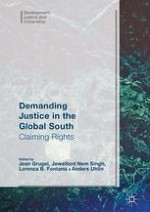2017 | OriginalPaper | Chapter
6. Situating Women’s Rights in Everyday Life: The EMPOWER Women’s Human Rights Report
Author : Juanita Elias
Published in: Demanding Justice in The Global South
Publisher: Springer International Publishing
Activate our intelligent search to find suitable subject content or patents.
Select sections of text to find matching patents with Artificial Intelligence. powered by
Select sections of text to find additional relevant content using AI-assisted search. powered by
